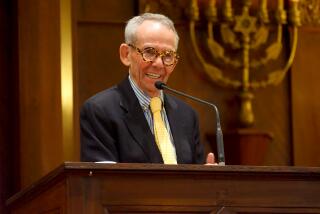BOOK REVIEW : The Uneasy Adventures of Nine Self-Made Men : THE GOLDIN BOYS: <i> Stories by Joseph Epstein</i> W. W. Norton $19.95; 213 pages
- Share via
The Goldin boys of the title story once gleamed with privilege and promise as the handsome, athletic twin sons of a prosperous Chicago lawyer, but as this tale opens, the narrator is attending the funeral of his longtime friend Buddy Goldin. Buddy, an attorney still in his 30s, has jumped from the window of his office building, leaving his stunned widow, devastated parents and absent brother to make what sense they can of his death.
Although the Goldin boys had been virtually inseparable as youngsters, their lives had diverged radically. Buddy took the traditional route to prosperity and success; Eddie rejected the materialistic values of his family to teach in various Third World countries. On the day of the funeral, Eddie’s whereabouts are unknown. The job of exploring and explaining the tragedy falls to the narrator, who makes a fine job of investigating the inexorable disintegration of a once prominent and envied family.
Best known as a controversial and outspoken essayist, Epstein has made his first venture into fiction with “The Goldin Boys,” and its nine stories show his preoccupation with the dynamics of social change. For the most part, his central characters are self-made Chicago men on their way up, like super-salesman Sheldon Kaplan or Harry Resnick, the happily married owner of a thriving furniture company.
Occasionally Epstein turns his attention to the economic depths, as in “Schlifkin on My Books,” an edgy, funny and ultimately bleak account of the inadvertent relationship between a kindhearted novelty dealer and the near-derelict who becomes his dependent and nemesis. The only tale that strays from this limited bourgeois world is “The Count and the Princess,” and even in this affecting story of an exiled Polish nobleman and his hopeless infatuation with one of his students, a sexy but shallow divorcee, the author continues to concentrate on class distinctions.
The portrait of Count Kinski--once heir to a vast estate and now reduced to genteel poverty as an instructor in a community college--is an extraordinary study of a man poised on one side of an unbridgeable cultural and intellectual gulf while the woman he adores has her feet planted firmly on the other.
“Kaplan’s Big Deal” explores similar territory from a different perspective. In this meticulously wrought tale, a supremely ordinary, somewhat crass man with no interest whatever in matters of the mind meets a French academic and her young son on a plane. Kaplan is a bachelor car dealer: rough-cut, fast-talking and despite some superficial polish, a hustler at heart.
The type is universal, with only minor geographic and ethnic variations, but lately Kaplan has begun to think of what his no-strings, solitary life might be like 15 or 20 years hence, and he’s vulnerable. Francoise’s son, Philippe, enchants him, and he fantasizes about becoming the father of such a winsome and beautiful child.
To this end, he woos the mother, who is struggling to support herself and the boy on a scholar’s salary. The process becomes the tale, perhaps the most complex and satisfying of the collection.
Clearly as much at home in the groves of academe as in the steakhouses of the Loop, Epstein can be deliciously ironic when he’s dealing with intellectual pretension. “Another Rare Visit With Noah Danzig” recounts the aftermath of a pedantic critic’s too-close examination of a celebrated writer’s body of work, and “No Pulitzer for Pinsker” chronicles the long, uneasy connection between another literary lion and the narrator, a reluctant but loyal friend.
In these two stories, the author temporarily abandons the thickets of emotional relationships between men and women to concentrate on male rivalry, the area in which both writer and reader have the most fun.
Next: Richard Eder reviews Francis Steegmuller, “A Woman, A Man and Two Kingdoms” (Knopf).
More to Read
Sign up for our Book Club newsletter
Get the latest news, events and more from the Los Angeles Times Book Club, and help us get L.A. reading and talking.
You may occasionally receive promotional content from the Los Angeles Times.










